|
|
|
Sort Order |
|
|
|
Items / Page
|
|
|
|
|
|
|
| Srl | Item |
| 1 |
ID:
152110
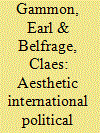

|
|
|
|
|
| Summary/Abstract |
Though aesthetics is commonly understood as the reflection on art, and especially beauty, it is a broader concern, captured by the term’s etymology in the Greek ‘aisthesis’, referring to perception and sense impressions. Aesthetics, though, is not simply a passive process, of how the outer world strikes the mind, but an interactive one, which, through our selective attention, we attenuate the complexities of reality. Aesthetics is about the formation of the objects that constitute our social milieu, those we invest in to give rhythm, order and unity to our lives. Aesthetics is also, vitally, about the formation of the self, about how we constitute ourselves as objects in relation to the world.
|
|
|
|
|
|
|
|
|
|
|
|
|
|
|
|
| 2 |
ID:
178689
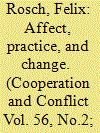

|
|
|
|
|
| Summary/Abstract |
How do practices change? To approach this in practice theory (PT) is a widely debated question. This article brings PT in conversation with the study of emotions in International Relations by considering the role of affect in practice changes. For it is affect that permeates the placiotemporal and bodily constellations during practice performances, continuously provoking changes in and through practices. In initiating this conversation, this article adds to current PT literature by arguing that world political transformations not only find their origin in external conditions, identified as such through individual reflection, but also in affective dynamics of the everyday. To elaborate this more theoretical argument, this article evolves against the empirical backdrop of dancing as an everyday international practice at the Congress of Vienna (1814–1815). Affect that permeated dances in Vienna not only substantiated changes in this practice but, with the waltz replacing the minuet as the preferred dance among international political decision-makers, also changes through it occurred. While the minuet embodied collective sentiments of a transboundary European elite, the waltz helped to further national imaginations of world politics.
|
|
|
|
|
|
|
|
|
|
|
|
|
|
|
|
| 3 |
ID:
101385
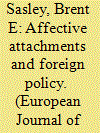

|
|
|
|
|
| Publication |
2010.
|
| Summary/Abstract |
Although the important role of emotions in decision-making has been highlighted in the psychology, neural science, and decision research literatures, this conclusion has not been widely adopted in foreign policy analysis and International Relations (IR). Of the work that has been done, much of it has been focused on public perceptions and the impact on foreign policy, but not on elites and the actual decisions of foreign policy. This article seeks to address this imbalance by examining the role of one element of emotion - affect - on key foreign policy decision-makers. It argues that the greater the emotional attachment a leader has to an object, the less flexible she is in foreign policy toward that object. The model is used to explain a critical puzzle in IR: Israel's decision to pursue and sign the 1993 Oslo Accords.
|
|
|
|
|
|
|
|
|
|
|
|
|
|
|
|
| 4 |
ID:
121198
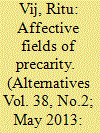

|
|
|
|
|
| Publication |
2013.
|
| Summary/Abstract |
This article explores the affective structure of precarity and its gendered antinomies. Building on feminist critical engagements that call attention to the elision of reproductive and household labor in emergent theorizations of precarity, it draws on Lauren Berlant's work on affective attachments to offer a reading of cinematic narratives of precarity in contemporary Japan, a space only tangentially referenced in a largely Euro-American discourse on precarity. Delineating precarity as an affective field of intelligibility, both inimical to yet potentially enabling of a feminist opening, this article offers an analysis of two films: Japan a Story of Love and Hate shows how the affective normalization of women's precarity privileges the affect of loss for men in precarity, suggesting it is the loss of mastery entailed by the movement of men from once secure to insecure work that mobilizes an affective-political turn under the sign of precarity; in contrast, a reading of Tokyo Sonata as an allegorical treatment of precarity shows how the feminization of men wrought within precarity can open up the possibility for a normative rupture of prevalent gendered hierarchies.
|
|
|
|
|
|
|
|
|
|
|
|
|
|
|
|
| 5 |
ID:
112735
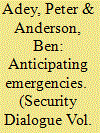

|
|
|
|
|
| Publication |
2012.
|
| Summary/Abstract |
In this article, we examine contemporary 'resilience' through UK preparedness - an apparatus of security enacted under the legal and organizational principles of UK Civil Contingencies and civil protection legislation and practices. By examining the design, practices and technologies that constitute the exercises performed within Civil Contingencies, the article first suggests that the manner in which exercises have been mobilized as examples of preparedness and apocalyptical imaginations of the 'unthinkable' should be understood within the highly specific societal and political contexts that shape them. More substantially, the article then provides a nuanced understanding of the life of the security assemblage through an in-depth analysis of the exercise and its design, materials, play and contingent relations. Seeking to deepen and widen concerns for what matters in security studies, animated by concern for objects, bodily affects, contingencies and excess, the article contends for a more serious concern with how security and its practices can surprise, shock, enthral and disrupt in a manner that need not only be associated with failure.
|
|
|
|
|
|
|
|
|
|
|
|
|
|
|
|
| 6 |
ID:
174904
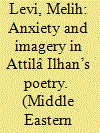

|
|
|
|
|
| Summary/Abstract |
The article offers a detailed study of the twentieth-century Turkish poet Attilâ İlhan’s early work by focusing on the use of imagery and atmosphere. The critical term in Turkish literary studies for imagery is imge and the term has acquired an unsettlingly wide semantic range since its popularization with the rise of the İkinci Yeni poetry movement in the 1950s and 60 s. İkinci Yeni's descriptive procedures continue to be the dominant influence on Turkish poetry today and this article turns the spotlight on Attilâ İlhan in order to trace alternative conceptions of imagery which were developed concurrently and in reaction to the İkinci Yeni movement. The article engages with relevant psychoanalytic and affect theories that help elucidate İlhan's use of anxiety as a socially and poetically constitutive force.
|
|
|
|
|
|
|
|
|
|
|
|
|
|
|
|
| 7 |
ID:
193223
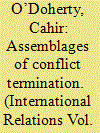

|
|
|
|
|
| Summary/Abstract |
The question of how wars end is of continued importance, especially in the context of the ongoing War on Terror. This question has traditionally been approached within International Relations through rational choice theories, logical modelling and game theory. Such approaches have become increasingly ill-suited to capturing the complexity and ambiguity of contemporary warfare and the War on Terror in particular. These battlefield ambiguities are often at odds with political and public desires to see decisive victory in wars. This article builds on recent critical work within War Termination Studies in order to re-conceptualise the end of war as assemblages. By paying greater attention to the affects inculcated by political rhetoric surrounding war and utilising the concepts of affect and emergence, this article presents a novel approach to the study of contemporary war termination. Utilising popular culture, increasingly seen as a crucial site of global politics, the case study analysed here advances the argument that sacrifice emerges from cinema and presidential rhetoric as a trope that allows leaders to claim victory in war despite indecisive conditions of the ground. Through affective cinematic encounters, conceptualised here through the end of wars assemblages, audiences can become more accepting of such political claims.
|
|
|
|
|
|
|
|
|
|
|
|
|
|
|
|
| 8 |
ID:
189909
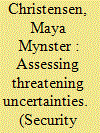

|
|
|
|
|
| Summary/Abstract |
The preemptive turn in counterterrorism has turned future uncertainties into key objects of contemporary security governance. From an empirically grounded perspective, this article contributes with novel insight into the everyday practices of preemptive politics. Focusing on Ghana as a unique case through which to trace how the mobilization of affect accelerates the transnational proliferation of counterterrorism measures and the commodification of future uncertainty, it shows how the global War on Terror has shaped the emergence of counterterrorism in a context characterized by the absence of terrorist attacks on home soil. Exploring how preemption animates outreach activities, simulation exercises, and nighttime patrols, it shows how police officers attempt to make uncertain futures tangible and actionable through practices of imagination and performance. Aimed at assessing terrorist threats that have not (yet) materialized, the article argues that preemptive policing practices cause a conflation of ordinary crime and extraordinary terror that inflates already existing uncertainties and subverts the institutional security logics of preemption.
|
|
|
|
|
|
|
|
|
|
|
|
|
|
|
|
| 9 |
ID:
127803
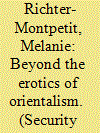

|
|
|
|
|
| Publication |
2014.
|
| Summary/Abstract |
Contrary to commonsense understandings of torture as a form of information-gathering, confessions elicited through the use of torture produce notoriously unreliable data, and most interrogation experts oppose it as a result. With a focus on the US carceral regime in the War on Terror, this article explores the social relations and structures of feelings that make torture and other seemingly ineffective and absurd carceral practices possible and desirable as technologies of security. While much of international relations scholarship has focused on the ways in which affective and material economies of Orientalism are central to representations of the 'terrorist' threat, this article connects the carceral violences in the racialized lawfare against Muslimified people and spaces to the capture and enslavement of Africans and the concomitant production of the figure of the Black body as the site of enslaveability and openness to gratuitous violence. The article further explores how these carceral security practices are not simply rooted in racial-sexual logics of Blackness, but themselves constitute key sites and technologies of gendered and sexualized race-making in this era of 'post-racial triumph' (HoSang and LaBennett, 2012: 5).
|
|
|
|
|
|
|
|
|
|
|
|
|
|
|
|
| 10 |
ID:
159963
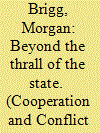

|
|
|
|
|
| Summary/Abstract |
Although the idea of the state pervades the scholarship and practice of international interventions, developing adequate knowledge of intervention contexts such as Solomon Islands requires decentring dominant perceptions about possible sources of socio-political order. In response, this article demonstrates the value of ‘relationality’ and ‘affect’ for analysing the diverse ways in which governance arises as an effect of social practice, without assuming that the state is unimportant or romanticizing statelessness. Giving conceptual priority to relations over entities while considering hitherto neglected affective forms of human interaction enables the identification of diverse micro-political forms of socio-political order and peace governance effects. An autoethnographic examination of relational-affective peace governance in post-conflict Solomon Islands shows that circulations of affect, feeling and emotion attach more strongly to customary and church institutions than they do to the state or to international interveners. This demonstrates the need to engage with unexpected sources of governance while the requirement to analyse findings within a broader historical frame signals the need to also engage with the state. A relational-affective approach, which has the potential for wider application, thus provides a way of analysing and engaging with diverse forms of political order in international interventions beyond the predilections of Northern scholarship.
|
|
|
|
|
|
|
|
|
|
|
|
|
|
|
|
| 11 |
ID:
191700
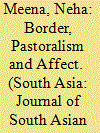

|
|
|
|
|
| Summary/Abstract |
The demarcation of the India–Pakistan border on the western side of Rajasthan in 1947 had profound implications for the pastoral communities there. Based on an archival history of the Thar desert and ethnographic fieldwork in the border villages of Rajasthan, this paper explores how pastoralists interact with the border and the bordering practices of the state. Focusing on the Raika community, the paper examines how borders impact the mobility, identity and traditional life of the pastoralists. Building on Raika memories of mobility and connections across the border, the paper argues that the interactions of the pastoralists maintain an affective relationship with this war and violence affected borderland, despite the administrative practices of surveillance, border maintenance and developmental projects that have produced an environment of insecurity and uncertainty.
|
|
|
|
|
|
|
|
|
|
|
|
|
|
|
|
| 12 |
ID:
152969
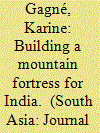

|
|
|
|
|
| Summary/Abstract |
This article examines the relationship between affect and the state in post-colonial India, foregrounding sympathy as a feeling that arises from the embodied encounters and interactions between the state and a local population through state-building in the Himalayas. It establishes the emergence of sympathy in the materiality of the Himalayas and in the historical conjuncture of the passage to Indian nationhood in Ladakh, which was marked by the mobilisation of the local population in the defence of the territory of India amid the first Indo-Pakistani war (1947–48). This article argues that sympathy, in leading the state to reimagine the population of Ladakh, is integral to the reconfiguration of the region into a border area and to the rethinking of the sovereignty of the Indian state at its Himalayan frontier.
|
|
|
|
|
|
|
|
|
|
|
|
|
|
|
|
| 13 |
ID:
120089
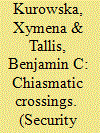

|
|
|
|
|
| Publication |
2013.
|
| Summary/Abstract |
This article makes an argument about chiasmatic knowledge production that seeks to cut across the entrenched division between the subject and object of inquiry, on the one hand, and the narrative and normative authority of the scholar, on the other, that is inherent in most writing in international relations. We revisit our own research encounter in the field of European security to explore the premises and implications of fieldwork relationships between researchers and practitioners and show their potentially transformative effects. Classifying such engagements as acts of professional transgression by both sets of parties overlooks their promise to facilitate the understanding of security practice 'from within' and to provide for tangible scholarly and political criticality. It is argued that, in the restricted realm of security, extensive interaction with practitioners could be a proxy for participant observation. Yet, we look further than that. We develop a concept of 'chiasmatic crossings' that reflects and helps theorize the ideational give-and-take and conceptual ruptures in the process of co-authorship that are indicative of distinct trajectories in European security research. This challenges the knowledge claims and static positions of both 'problem-solving' and 'critical' scholars in the field.
|
|
|
|
|
|
|
|
|
|
|
|
|
|
|
|
| 14 |
ID:
181924


|
|
|
|
|
| Summary/Abstract |
In its one hundred years of existence, the Communist Party of China has experimented with how to connect its narratives of legitimacy to people's affects. In this essay, I trace the conceptualization of gratitude, from its repudiation in the Mao era as a vestige of feudalism and imperialism to its return in the reform era as a re-verticalization of Party sovereignty. The paper addresses four examples of gratitude work: Politburo Standing Committee member Wang Yang's short-lived critique of gratitude in the name of a different conception of popular sovereignty; the celebration of the tenth anniversary of the Sichuan earthquake as a day of gratitude; the detention of Uyghurs in Xinjiang who are taught to be grateful to the Communist Party in a campaign of religious de-radicalization; and the refusal of gratitude in quarantined Wuhan during the COVID-19 pandemic. In these cases, the Communist Party's sovereignty stands at the threshold between bio- and necro-politics, promising life and salvation in the midst of death and destruction.
|
|
|
|
|
|
|
|
|
|
|
|
|
|
|
|
| 15 |
ID:
170368
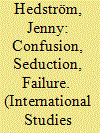

|
|
|
|
|
| Summary/Abstract |
This article highlights the influence of emotions, affective experiences, and rumors on the construction of knowledge within research on conflict and in international politics, as well as within the research process itself. Drawing from fieldwork undertaken in a conflict zone in Myanmar, it suggests that academic knowledge production practices are informed both by the (violent) context in which research is undertaken and by the demands of the discipline to produce a scientifically accepted piece of research. It proposes that attention to emotions may facilitate strong objectivity (Harding 1992) by foregrounding the relationship between research participants, researchers, and the broader research (institutional and immediate) contexts. It introduces the term “rumors-as-affect” as a means to discuss how affective atmospheres or events in the research environments inform research. Three interview situations are presented, in which different emotional reactions are highlighted, focusing on “confusion and guilt”; “seduction”; and finally, “failure and ignorance.” These events illustrate how, in recognizing the role emotions and affective atmospheres play in research on conflict and in international politics (cf. Crawford 2014; Hutchison and Bleiker 2014; Ross 2013), researchers may begin to do justice to our representations of what is encountered in the field and how knowledge is constructed within the discipline.
|
|
|
|
|
|
|
|
|
|
|
|
|
|
|
|
| 16 |
ID:
165015
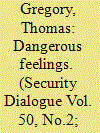

|
|
|
|
|
| Summary/Abstract |
Between 2006 and 2007 an average of one Iraqi civilian was killed or injured at a coalition checkpoint each day. In many cases, civilians were shot because soldiers had misinterpreted their behaviour as hostile or as a demonstration of hostile intent. In other words, the soldiers responsible thought that they were acting in self-defence against an imminent threat. Some analysts have argued that these killings can be explained by ambiguities in the rules of engagement, but such explanations wrongly assume that the decision to kill is a purely rational calculation. Drawing upon the work of Sara Ahmed, William Connolly and George Yancy, I will argue that the interpretation of hostile intent and the decision to use lethal force are affective judgements rather than purely conscious decisions and, as such, are shaped by feelings, moods and intuitions. Moreover, I will argue that these judgements are never entirely neutral but clouded by a set of pre-existing assumptions that mark certain bodies as dangerous before they even have a chance to act. Drawing upon an archive of incident reports filed in the aftermath of these shootings and interviews with former soldiers, this article will show how seemingly innocuous behaviours were so readily mistaken for hostile acts with decidedly deadly consequences for the local population.
|
|
|
|
|
|
|
|
|
|
|
|
|
|
|
|
| 17 |
ID:
151189
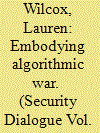

|
|
|
|
|
| Summary/Abstract |
Through a discussion of drone warfare, and in particular the massacre of 23 people in the Uruzgan province in Afghanistan in 2010, I argue that drone warfare is both embodied and embodying. Drawing from posthuman feminist theorists such as Donna Haraway and N Katherine Hayles, I understand the turn toward data and machine intelligence not as an other-than-human process of decisionmaking that deprives humans of sovereignty, but as a form of embodiment that reworks and undermines essentialist notions of culture and nature, biology and technology. Through the intermediation of algorithmic, visual, and affective modes of embodiment, drone warfare reproduces gendered and racialized bodies that enable a necropolitics of massacre. Finally, the category of gender demonstrates a flaw in the supposed perfectibility of the algorithm in removing issues of identity or prejudice from security practices, as well as the perceptions of drone assemblages as comprising sublime technologies of perfect analysis and vision. Gender as both a mode of embodiment and a category of analysis is not removed by algorithmic war, but rather is put into the service of the violence it enables.
|
|
|
|
|
|
|
|
|
|
|
|
|
|
|
|
| 18 |
ID:
144780
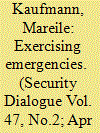

|
|
|
|
|
| Summary/Abstract |
The idea of the complex emergency has given rise to the notion of resilience as a form of acting out security. While security policies largely embrace the concept of resilience, critical scholarship points to the ‘responsibilization’ of the threatened subject, who is ‘programmed’ to act out security in a fashion that internalizes neoliberal values. This behaviour is trained through disciplinary practices, such as exercises, that seek to conduct the conduct of disaster populations. However, is the resilient subject only ever an instance of programmes and disciplinary power? This article takes a look at how self-organization comes about and how this process can be conceptualized through affect. It uses the setting of a cyber-security exercise to describe the dynamic interplay between affect and re/action. Building on Spinoza’s understanding of affect as the onset for action, the article discusses what affect theory contributes to resilience theory. It concludes that, as a form of acting out security, resilience incorporates both ‘programmed’ and ‘self-determined’ actions. Both forms of acting, however, imply that the resilient subject has no choice but to act out security. Given this fundamental restraint, powerlessness as the incapacity to act appears as one of the few instances that escape the governmental logic of resilience.
|
|
|
|
|
|
|
|
|
|
|
|
|
|
|
|
| 19 |
ID:
165900


|
|
|
|
|
| Summary/Abstract |
This article discusses the role of private actors in the finance–security nexus. It analyses how the delegated authority bestowed upon private actors in anti-money laundering and combating terrorist financing (AML/CTF) may be perceived not as empowerment but as an expression of a threatening invasive and hegemonic order: To reap the possible benefits offered by the security paradigm in the ‘war on terror’, private actors must relinquish a degree of self-determinacy. This threat to self-determinacy, it is argued, foregrounds (affective) resistance among for-profit professionals. The article probes how for-profit professionals engage in (affective) resistance through self-authorship. Evoking Hansen’s discourse analysis on linkages and differentiation, the empirical analysis delineates how lawyers in the UK and France resist being resilient subjects in AML/CTF. It shows how for-profit professionals use self-authorship for purposes of (affective) resistance. Specifically, it finds that the linkages and counter-values subjects pin to the perceived invasive order of AML/CTF serve as poles in the fence protecting a space where professional identity is safeguarded. In this way, actors became resisting subjects when faced with obligations to be resilient. In conclusion, the article affords nuance to the role of private actors in the finance–security nexus by outlining how the forging of the first link in De Goede’s security chain is undermined.
|
|
|
|
|
|
|
|
|
|
|
|
|
|
|
|
| 20 |
ID:
192010


|
|
|
|
|
| Summary/Abstract |
This article brings an intimate perspective to bear upon the violence of economic sanctions, shifting attention away from an exclusive focus on state actors, in order to examine how “‘wounds” enter politics’.1 In this research, I ‘stretch’ Berlant’s notion of the intimate public, reconfiguring it as a decolonial analytic lens on subaltern suffering in conditions of endemic imperial violence. I focus on the Facebook page of the Iranian chief negotiator, Javad Zarif, during Iran’s talks with the P5+1 powers over its nuclear programme, under the pressure of what the Obama administration itself termed ‘crippling’ economic sanctions. Examining Zarif’s audience’s readings of his back injury during the talks as representing the ‘crippled’ nation, I trace how subaltern injury is intimately narrated through a racialised framework of disablement and ‘recovery’, where ‘recovery’ signifies a desanctioned and deracialised national body. I firstly complicate the prevailing conception of the intimate public as oriented around a ‘national fantasy’, theorising it as an affective structure that simultaneously locates imperial power, as well as the nation-state, as sources of complaint and hope; secondly, I draw on a critical disability (‘crip’) lens to understand the intimate public as mediating both the debilitation of racialised underdevelopment, and the fantasy of a normative, ‘developed’ national body in a post-sanctions future. Through examining the intimate politics of economic sanctions, this study contributes to a decolonial perspective on the entanglements of affect, nationalism and imperial violence.
|
|
|
|
|
|
|
|
|
|
|
|
|
|
|
|
|
|
|
|
|